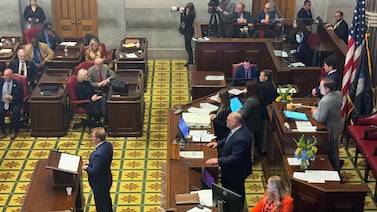Colorado won’t require preschools to make quality improvements during the first year of the state’s new universal preschool program, which launches in August.
State officials have consistently pledged that the new program will provide high-quality preschool, which experts say can produce short- and long-term benefits for kids. But they announced this week what they called “keep doing what you’re doing” guidance. That means preschool providers can continue with their current practices and policies.
The decision to hold off on mandating new preschool quality standards is more evidence of Colorado’s rush to roll out the major new program on an extremely tight timeline — an issue that providers and advocates have raised repeatedly in the last year.
The universal program will offer 10-30 hours a week of tuition-free preschool to 4-year-olds statewide and 10 hours a week to some 3-year-olds. It’s funded in part with a voter-approved nicotine tax.
Dawn Odean, the state’s universal preschool director, said in a statement Thursday the new guidance was created to alleviate provider concerns about “the unknown” and allow them to prepare for the program launch.
The state’s decision means that next fall, more than 30,000 Colorado children who’ve signed up for universal preschool will attend preschools that vary widely in quality. Some will attend programs with the state’s top Level 5 rating, which indicates excellence in several categories. Others will go to preschools with the lowest Level 1 rating, which indicates the program is licensed by the state and meets basic health and safety standards.
There are various ways to measure preschool quality, but class size caps, staff credentials, teacher training requirements, and curriculum choice may be among the criteria. The National Institute of Early Education Research at Rutgers University rates states using 10 benchmarks of preschool quality. Colorado’s existing state-funded preschool program, which serves about 15,000 4-year-olds, only meets four of the benchmarks.
Colorado is allowing some providers to have 24 students per class this fall, higher than the 16-student maximum the current state preschool program allows and the 20-student maximum the institute’s benchmark recommends.
Leaders from the Colorado Department of Early Childhood, which is running the universal preschool program, said they’ll adopt quality standards in the fall that will take effect in the summer of 2024.
Ann Schimke is a senior reporter at Chalkbeat, covering early childhood issues and early literacy. Contact Ann at aschimke@chalkbeat.org.







